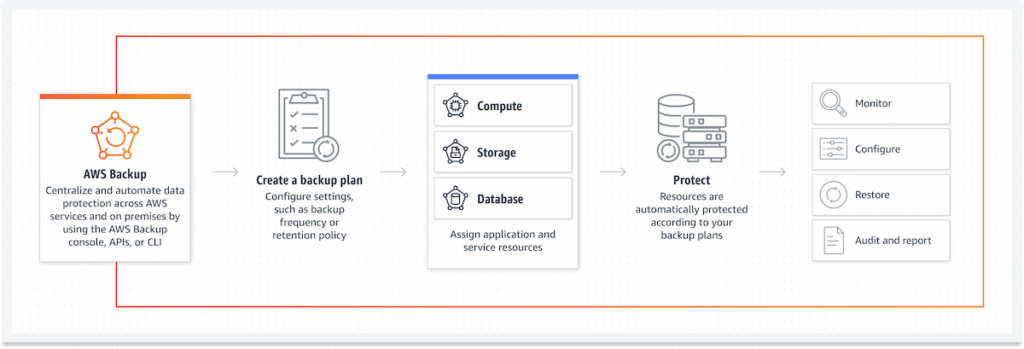In today’s world, data is the lifeblood of businesses. It drives decision-making, enables innovation, and powers growth. That’s why ensuring the security and accessibility of your company’s data is crucial. Enter AWS Backup, the comprehensive backup solution offered by Amazon Web Services.
With AWS Backup, you can protect and recover your data quickly whenever needed. But it’s not just about data protection. It also offers a range of benefits for your business. It provides a centralized backup console, simplifying the management of backups across different AWS services. It lets you define backup policies based on business requirements and compliance needs. Plus, it offers automated backup scheduling and monitoring capabilities.
Table of Contents
This guide will dive deep into why AWS Backup is essential for your business. We’ll explore its benefits and explore best practices for using this powerful tool. By the end, you’ll understand why it is a game-changer regarding data protection and recovery.
Read on to discover how AWS Backup can safeguard your business and give you peace of mind in an increasingly data-driven world.
What is AWS Backup?
AWS Backup is a fully managed backup service offered by Amazon Web Services (AWS) that provides a simple and cost-effective solution to back up your data across various AWS services. This service is designed to centralize and automate the backup of data across AWS cloud environments, making it an essential tool for modern businesses that rely on cloud infrastructure.

Importance of Data Backup for Businesses
Data loss can have catastrophic consequences for businesses. It can result in financial loss, damage to the company’s reputation, and even legal implications. That’s why data backup is essential. Having a reliable backup solution, you can ensure that your data is protected from accidental deletion, hardware failure, natural disasters, and cyberattacks.
Traditional backup methods, such as tape drives or external hard drives, have limitations. They can be time-consuming, prone to human error, and require manual intervention. On the other hand, AWS Backup offers a cloud-based backup solution that overcomes these challenges. It provides a scalable and secure way to back up your data, eliminating the need for physical storage devices and manual processes.
Do I Need to Backup My AWS Environment?
Absolutely. Backing up your AWS environment is essential. Despite the robust infrastructure and high reliability of AWS services, your data in the cloud is still susceptible to various risks, such as accidental deletions, data corruption, and cyber threats. Backups act as a safety net, ensuring you can quickly recover your data and maintain business operations in case of any unforeseen data loss. Moreover, backups are critical for compliance with various data protection regulations and can also be crucial in disaster recovery scenarios. Even in a cloud environment, the adage “better safe than sorry” holds, making backups indispensable to your overall data management and security strategy.
What AWS Services Should I Backup?
When determining which AWS services to back up, you should consider the criticality and nature of the data held within each service. Commonly backed-up services include Amazon Elastic Compute Cloud (EC2) for server instances, Amazon Relational Database Service (RDS) for relational databases, and Amazon Elastic Block Store (EBS) for block storage. Additionally, consider backing up Amazon Simple Storage Service (S3) for object storage, Amazon DynamoDB for NoSQL database services, and Amazon Elastic File System (EFS) for file storage.
Ultimately, the decision should align with your business needs, data importance, and regulatory requirements. Regularly backing up these services ensures that your vital business data is protected against loss and can be quickly restored, maintaining the continuity and integrity of your business operations.
Benefits of Using AWS Backup
1. Centralized Backup Console
With AWS Backup, you can manage all your backups from a single console. This centralized approach simplifies the backup process and reduces the risk of errors. You can easily create, manage, and monitor backups for multiple AWS services, including Amazon EBS, Amazon RDS, and Amazon DynamoDB, among others.
2. Flexible Backup Policies
AWS Backup allows you to define backup policies based on your business requirements and compliance needs. You can set up automated backup schedules, retention periods, and lifecycle rules. This flexibility ensures that your data is backed up according to your organization’s specific needs and regulatory obligations.
3. Automated Backup and Monitoring
AWS Backup automates the backup process, eliminating the need for manual intervention. You can schedule backups to run at specific times or intervals, ensuring that your data is protected without any effort on your part. Additionally, it provides monitoring capabilities, allowing you to track the status of your backups and receive notifications if any issues arise.
4. Fast and Reliable Recovery
In the event of data loss or corruption, AWS Backup makes it easy to restore your data. You can restore individual files, folders, or entire volumes depending on your recovery needs. It also ensures fast and reliable recovery, minimizing downtime and enabling business continuity.
5. Built-in Security
AWS Backup leverages the security features of Amazon S3, ensuring that your data is encrypted both in transit and at rest. You can also configure access controls to restrict who can manage and restore your backups. This built-in security gives you peace of mind, knowing that your data is protected from unauthorized access.
AWS Backup vs. Traditional Backup Methods
When comparing AWS Backup to traditional backup methods, several key advantages emerge. Firstly, it eliminates the need for physical storage devices, reducing costs and the risk of hardware failure. It also eliminates the manual effort required for backups, saving time and reducing the potential for human error.
Furthermore, AWS Backup offers greater scalability and flexibility. As your data grows, it can easily accommodate increased storage requirements without the need for additional hardware. Additionally, AWS Backup’s centralized console allows for easier management of backups across multiple AWS services, simplifying the backup process.
Best Practices for Implementing AWS Backup
It’s important to follow best practices when implementing the solution to make the most of AWS Backup. Here are some key recommendations:
1. Define a Backup Strategy
Before setting up AWS Backup, assess your organization’s backup needs and define a backup strategy. Determine the frequency of backups, retention periods, and recovery objectives based on your business requirements and compliance obligations.
2. Leverage Backup Policies
Take advantage of AWS Backup’s flexible backup policies. Define policies that align with your backup strategy and apply them to the relevant AWS resources. This ensures consistent and automated backup schedules, simplifying the management of backups.
3. Regularly Test Restores
Regularly test the restore process to ensure that your backups are functioning correctly. Simulate different recovery scenarios to validate the integrity and accessibility of your backed-up data. This practice helps identify any potential issues before they become critical.
4. Monitor Backup Status and Notifications
Stay proactive by monitoring the status of your backups and enabling notifications. AWS Backup provides monitoring capabilities and lets you set up email notifications for backup events. Regularly review these notifications to stay informed about the status of your backups.
5. Implement Data Lifecycle Management
Consider implementing data lifecycle management to optimize costs. AWS Backup allows you to define lifecycle rules that automatically transition backups to a lower-cost storage class after a certain period. This helps reduce storage costs while maintaining compliance with retention policies.
Monitoring and Managing Backups in AWS Backup
AWS Backup provides a comprehensive console for monitoring and managing your backups. The console lets you view backup status, track backup events, and perform restores. Here are some key features of AWS Backup:
1. Backup Dashboard
The backup dashboard provides an overview of your backup status, including the number of completed backups, backup errors, and backup events. It gives you a quick snapshot of the health of your backups.
2. Backup Job Details
The backup job details page provides detailed information about a specific backup job. You can view the backup status, backup time, and any associated errors or warnings. This page allows you to troubleshoot any issues with your backups.
3. Restore Options
The AWS Backup console offers various restore options depending on the type of resource you’re restoring. You can choose to restore an entire volume, individual files, or specific folders. The console provides a user-friendly interface for selecting and initiating restores.
4. Backup Settings
The backup settings page allows you to modify backup plans, retention periods, and other backup-related settings. You can make adjustments based on changing business requirements or compliance needs.
AWS Backup Pricing and Cost Optimization
AWS Backup pricing is based on the storage usage and the number of backup requests. The storage usage includes the size of your backups and the duration for which they are stored. The backup requests include backup, restore, and delete operations. To optimize costs, consider the following:
1. Data Lifecycle Management
Implement data lifecycle management to transition backups to a lower-cost storage class after a certain period. This helps reduce storage costs while still maintaining compliance with retention policies.
2. Backup Scheduling
Optimize backup scheduling to minimize the number of backup requests. Consider the frequency of backups and the retention periods to strike a balance between data protection and cost efficiency.
3. Monitoring Backup Usage
Regularly monitor your backup usage to identify any unexpected spikes or inefficiencies. Use the AWS Backup to view backup metrics and identify opportunities for optimization.
Conclusion: Why AWS Backup is a Must-have for Your Business.
In today’s data-driven world, ensuring the security and accessibility of your company’s data is paramount. AWS Backup provides a comprehensive and reliable solution for data protection and recovery. Its centralized backup console, flexible backup policies, and automated scheduling and monitoring capabilities make it a game-changer for businesses.
By implementing AWS Backup, you can safeguard your data against accidental deletion, hardware failure, and other threats. You can recover your data quickly and easily, minimizing downtime and ensuring business continuity. Its built-in security features and scalability provide peace of mind and let you focus on driving your business forward.
Don’t leave your data vulnerable. Embrace AWS Backup and take control of your data protection strategy. Start using it today and experience the benefits of a robust and reliable backup solution.






